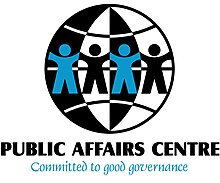| This article uses bare URLs, which are uninformative and vulnerable to link rot. Please consider converting them to full citations to ensure the article remains verifiable and maintains a consistent citation style. Several templates and tools are available to assist in formatting, such as reFill (documentation) and Citation bot (documentation). (September 2022) (Learn how and when to remove this message) |
 | |
| Abbreviation | PAC |
|---|---|
| Formation | 1994 |
| Type | Public Policy Think Tank |
| Headquarters | No.15, KIADB Industrial Area, Jigani - Bommasandra Link Road Bengaluru – 560105 |
| Location | |
| Founder | Dr. Samuel Paul |
| Chairman | Sudhakar Rao |
| Director | N. T. Abroo, IAS |
| Website | pacindia |
Established in 1994 Public Affairs Centre (PAC) conducts action research by using data analytics effectively. PAC pioneered the Social Accountability Tools (SATs) which is well received and accepted globally. In doing so PAC ensures that it includes the last mile-the community by giving "voice to the voiceless". As a Think Tank it constantly develops evidence-based research for public policies which has actionable points for scalability and applicability.
Currently it focusses on key SDGs to include primary education, health, livelihood and skills and gender which overarches all the SDGs. In short, it conducts effective research to provide accurate and judicious recommendations on key policy concerns. To do this PAC ensures that data analytics is woven into all its research projects. Through the policy engagements and communications activities it effectively unpacks and conveys key action points to relevant stakeholders.
History
In 1992, Samuel Paul, an economist, teacher and management professional, was part of a team that developed a 'report card' on Bangalore's public services. Anchoring on the twin concepts of measurement and comparison, the report cards generated objective and credible citizen feedback on issues related to the delivery of public services like quality, reliability, corruption and satisfaction. The approach received much national and international attention. The public debates the findings triggered and the media interest that issues like corruption generated provided a much needed stimulus to several public agencies in Bangalore to review their performances. These initial responses led to the formal creation of the Public Affairs Centre in 1994 with financial support from the National Foundation for India and the Ford Foundation. Dr. Paul was the founding chairperson.

Board
- Sudhakar Rao, Chairman
- Uma Mahadevan, Member
- H. Sudarshan, Member
- Prof. S Sadagopan, Member
- Dr. D. Rajasekhar, Member
- N.T. Abroo, IAS, Director
References
- "About PAC".
- https://www.vellorecmc.org/padma-shri-dr-samuel-paul-former-council-vice-chair-has-died/
- Paul, Samuel (15 May 2011). "Samuel Paul: Fighting corruption - Beyond the Lokpal Bill". Business Standard India.
- "Samuel Paul: Latest News, Videos and Photos on Samuel Paul - DNA News".
External links
- http://timesofindia.indiatimes.com/city/bengaluru/Karnataka-3rd-best-in-public-affairs-index/articleshow/51378219.cms
- http://www.thehindu.com/news/cities/bangalore/kerala-tn-secure-top-ranks-in-governance/article8347525.ece
- http://indianexpress.com/article/india/india-news-india/kerala-tn-karnataka-top-good-governance-list-report/